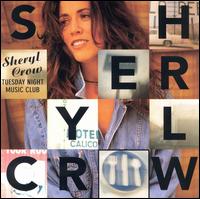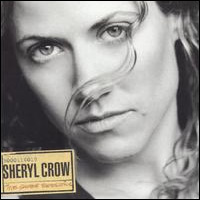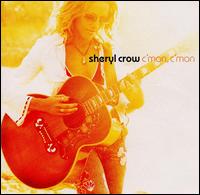|
Music Reviews
Alternative
Blues
Books
Christmas
Classic Rock
Country
Jazz
Lounge
Oldies
Power Pop
Punk & New Wave
Reggae
Rhythm & Blues
Seventies
Texas
Special Features
Randy's Rodeo
Sex Pistols
Motown
Halloween
Valentine's Day
Information
About Me
Feedback
Links
User's Guide
Support Me
Amazon
iTunes
Sheet Music Plus
|
Sock it to me, Santa! Visit my other website, www.hipchristmas.com Visit my other website, www.hipchristmas.com
 Don't
hate her because she's beautiful. Or successful. After all of her sultry, smoldering
videos and prodigious platinum record awards, Sheryl
Crow remains simply a very talented singer, songwriter, and performer. Developing
a soulful, alternative-friendly twist on classic rock, Crow emerged as one of the few
consistently satisfying mainstream artists of the 90's. With her debut album, Tuesday
Night Music Club (1993), Crow appeared to rocket out of nowhere to instant stardom,
but, truth be told, she was an overnight sensation years in the making. Sheryl had played
supporting roles around Hollywood since the mid-80's, singing backup for Don Henley,
Michael Jackson, Rod Stewart, and others, and placing songs with artists as prominent
as Eric Clapton. Signed to A&M in 1991, Crow began recording with Hugh Padgham,
best known for his work with Sting and Phil Collins; dissatisfied with the slick, ballad-laden,
pop sound, she shelved the project. Don't
hate her because she's beautiful. Or successful. After all of her sultry, smoldering
videos and prodigious platinum record awards, Sheryl
Crow remains simply a very talented singer, songwriter, and performer. Developing
a soulful, alternative-friendly twist on classic rock, Crow emerged as one of the few
consistently satisfying mainstream artists of the 90's. With her debut album, Tuesday
Night Music Club (1993), Crow appeared to rocket out of nowhere to instant stardom,
but, truth be told, she was an overnight sensation years in the making. Sheryl had played
supporting roles around Hollywood since the mid-80's, singing backup for Don Henley,
Michael Jackson, Rod Stewart, and others, and placing songs with artists as prominent
as Eric Clapton. Signed to A&M in 1991, Crow began recording with Hugh Padgham,
best known for his work with Sting and Phil Collins; dissatisfied with the slick, ballad-laden,
pop sound, she shelved the project.
A distraught Sheryl Crow subsequently fell in with a group of musicians including
producer Bill Bottrell, David Baerwald, and David Ricketts (the latter two comprising
both halves of David & David). Dubbed the "Tuesday Night Music Club" (after
the loose atmosphere of their jam sessions and the evening on which they usually convened),
Crow and her crew began developing a batch of songs that would eventually become her
hugely popular debut. Even that success didn't come quickly, as the album's first two
singles ("Run Baby Run" and "Leaving Las Vegas") made little impression. Tuesday
Night Music Club languished for nearly a year before "All I Wanna Do" became
a runaway radio smash. Musically organic and lyrically incisive, Tuesday
Night Music Club fell into the yawing void between Nirvana and Michael Bolton,
where a huge audience waited, hungry for entertaining, intelligent, adult-oriented
rock. Eventually, Tuesday
Night Music Club found that audience, peaking at #3 and spending over two years
on the charts while yielding two more hit singles ("Strong Enough" and "Can't
Cry Anymore") and earning a trophy case full of awards (three Grammys, seven-times
platinum).
 With
the tremendous success of Tuesday
Night Music Club monopolizing her attentions, Crow's self-titled sophomore disc
didn't hit the shelves for three years. In the intervening period, the singer faced
a number of public relations hurdles. Most profoundly, the other members of the Music
Club felt Crow was underplaying their contributions to the hit album, with Baerwald
particularly vocal in his insinuations that Crow was a minor player in the creative
process. In addition, Crow was tied (however unfairly) to two deaths - writer John
O'Brien (who wrote the book upon which "Leaving Las Vegas" was based) and
Kevin Gilbert (Music Club drummer and former Crow paramour). Plus, Crow was fighting
the perception of her as just another party girl - thanks to the superficially carefree
perspective of her signature hit, "All I Wanna Do." With
the tremendous success of Tuesday
Night Music Club monopolizing her attentions, Crow's self-titled sophomore disc
didn't hit the shelves for three years. In the intervening period, the singer faced
a number of public relations hurdles. Most profoundly, the other members of the Music
Club felt Crow was underplaying their contributions to the hit album, with Baerwald
particularly vocal in his insinuations that Crow was a minor player in the creative
process. In addition, Crow was tied (however unfairly) to two deaths - writer John
O'Brien (who wrote the book upon which "Leaving Las Vegas" was based) and
Kevin Gilbert (Music Club drummer and former Crow paramour). Plus, Crow was fighting
the perception of her as just another party girl - thanks to the superficially carefree
perspective of her signature hit, "All I Wanna Do."
Fair or not, these perceptions were debunked by Sheryl
Crow when it finally appeared in 1996. While not quite the equal of her debut,
the album's songs were sufficiently strong and the sound sufficiently unique to prove
that Sheryl Crow was her own woman and a force to be reckoned with. Crow produced
the record herself (with assistance from Mitchell Froom), giving it a dense, claustrophobic
feel that contrasted starkly with the warm, earthy groove of Tuesday
Night Music Club. While the singles extracted from the album (including "If
It Makes You Happy" and "Everyday Is A Winding Road") were relatively
upbeat, the overall tenor of Sheryl
Crow is dark, gloomy, and foreboding - hardly the demeanor of a party girl.
 On
her third album, The
Globe Sessions (1998), Sheryl Crow returned to more of a naturalistic, group-oriented
approach. Rather than the rootsy interplay of Tuesday
Night Music Club, Crow opted for a hard rock sound not unlike the Rolling Stones
circa Tattoo
You. Standout tracks like "There Goes The Neighborhood" and "My
Favorite Mistake" featured Keef-styled guitar riffs jousting with soulful horn
licks, setting off lyrics notably more cogent and narrative than the stream-of-consciousness
libretto of Sheryl
Crow. Still, The
Globe Sessions was a bit of a comedown from the knockout combination of her two
previous albums. By this point, however, Crow was a proven star, and The
Globe Sessions notched her third straight platinum album. (Insist upon the 1999
reissue of The
Globe Sessions featuring Crow's folksy rendition of Guns 'N Roses' "Sweet
Child O' Mine," her contribution to the soundtrack of Adam Sandler's movie, Big
Daddy). On
her third album, The
Globe Sessions (1998), Sheryl Crow returned to more of a naturalistic, group-oriented
approach. Rather than the rootsy interplay of Tuesday
Night Music Club, Crow opted for a hard rock sound not unlike the Rolling Stones
circa Tattoo
You. Standout tracks like "There Goes The Neighborhood" and "My
Favorite Mistake" featured Keef-styled guitar riffs jousting with soulful horn
licks, setting off lyrics notably more cogent and narrative than the stream-of-consciousness
libretto of Sheryl
Crow. Still, The
Globe Sessions was a bit of a comedown from the knockout combination of her two
previous albums. By this point, however, Crow was a proven star, and The
Globe Sessions notched her third straight platinum album. (Insist upon the 1999
reissue of The
Globe Sessions featuring Crow's folksy rendition of Guns 'N Roses' "Sweet
Child O' Mine," her contribution to the soundtrack of Adam Sandler's movie, Big
Daddy).
Not counting a guest-cluttered concert album (Live
From Central Park, 1999), Sheryl Crow took a well-deserved break from the recording
studio, not returning till 2002 with the bright, upbeat C'mon
C'mon. While no masterpiece, the album seemed to signal that Crow finally felt
at home in her own skin, content to pursue her muse wherever it leads - to waters
as shallow (if irresistible) as "Soak Up The Sun" or cliffs as craggy as
the title song, a bittersweet tale of doomed lovers. Crow had a hand in writing and
producing every song on C'mon
C'mon but felt comfortable sharing the spotlight with nearly half the Greater
Los Angeles white pages - Stevie Nicks, Don Henley, Liz Phair, Lenny Kravitz, Natalie
Maines, and Gwynyth Paltrow, to name but a few, appear on the record.
 Thus, C'mon
C'mon plays like a satisfying denouement to the first portion of Sheryl Crow's
career, proof that she no longer has anything to prove. Like Steve McQueen, she don't
need no fast machine - she'll proceed at her own pace towards a destination of her
own choosing. The
Very Best Of Sheryl Crow (2003), then, serves well as a bookend, neatly collecting
nearly every significant track from her first ten years as a headline act. Throughout
Crow's career, the cream of her music has always risen to the top, with her most
memorable songs inevitably being released as singles and almost invariably scaling
the top of the charts. The
Very Best Of Sheryl Crow has most of these, and what's missing is relatively
minor (including "Can't Cry Anymore" from Tuesday
Night Music Club; "Anything But Down" from The
Globe Sessions; and the title track from C'mon
C'mon). Two new tracks ("Light In Your Eyes" and a cover of Cat Stevens' "The
First Cut Is the Deepest") help take up the slack. Thus, C'mon
C'mon plays like a satisfying denouement to the first portion of Sheryl Crow's
career, proof that she no longer has anything to prove. Like Steve McQueen, she don't
need no fast machine - she'll proceed at her own pace towards a destination of her
own choosing. The
Very Best Of Sheryl Crow (2003), then, serves well as a bookend, neatly collecting
nearly every significant track from her first ten years as a headline act. Throughout
Crow's career, the cream of her music has always risen to the top, with her most
memorable songs inevitably being released as singles and almost invariably scaling
the top of the charts. The
Very Best Of Sheryl Crow has most of these, and what's missing is relatively
minor (including "Can't Cry Anymore" from Tuesday
Night Music Club; "Anything But Down" from The
Globe Sessions; and the title track from C'mon
C'mon). Two new tracks ("Light In Your Eyes" and a cover of Cat Stevens' "The
First Cut Is the Deepest") help take up the slack.
Stopping short of calling Crow a singles artist - she makes good albums, and I own
them all - The
Very Best Of Sheryl Crow will suffice for most fans. On the downside, this otherwise
laudable collection does virtually nothing to corral Crow's countless non-LP tracks
recorded as b-sides or for compilations and soundtracks. While The
Very Best Of Sheryl Crow (regrettably) includes the singer's duet with Kid Rock
(why do people take that moron seriously?), it omits every other hard-to-find Sheryl
Crow cut. In addition to "Sweet Child O' Mine" (mentioned above), these scattered
recordings include "All By Myself" (Eric Carmen cover, b-side of "Run
Baby Run," 1993); Solitaire (from If
I Were A Carpenter, 1994); "D'yer Mak'er" (from Encomium:
A Tribute To Led Zeppelin, 1995); "Keep On Growing" (Derek & the
Dominos cover, b-side of "If
It Makes You Happy," 1996); "Tomorrow Never Dies" (title song from
the James
Bond movie, 1997); "Straight To The Moon" (b-side of "There Goes
The Neighborhood," 1998); "Juanita" (from Return
Of The Grievous Angel: A Tribute to Gram Parsons, 1999); "Long Gone Lonesome
Blues" (from Timeless:
Hank Williams Tribute, 2001); "Mother Nature's Son" (Beatles cover from I
Am Sam, 2002); and "Missing" (bonus track from UK edition of C'mon
C'mon, 2002). And that's just the highlights....
 Despite
Sheryl Crow's productive first decade, I suspect her best - or, at least, most important
- work is behind her. Never the most original rocker in town, she continues to draw
heavily on traditional music, classic rock, and a host of obvious influences - Bonnie
Bramlett, Fleetwood Mac, Little Feat, the aforementioned Stones, and others. Crow made
her mark early on, and her music has grown more conservative (though only slightly
less satisfying) ever since. The
Very Best Of Sheryl Crow only reinforces that position by placing the razzle-dazzle
of her early work in proper perspective. Crow comes across a confident artist of some
depth but never impresses the way, for instance, Tom Petty does. The sense of risk,
uncertainty, even danger necessary for great art just isn't part of Sheryl Crow's music.
While she is sincere, insightful, professional - and looks smashing in leather pants
- that's not the stuff of which legends are made. Despite
Sheryl Crow's productive first decade, I suspect her best - or, at least, most important
- work is behind her. Never the most original rocker in town, she continues to draw
heavily on traditional music, classic rock, and a host of obvious influences - Bonnie
Bramlett, Fleetwood Mac, Little Feat, the aforementioned Stones, and others. Crow made
her mark early on, and her music has grown more conservative (though only slightly
less satisfying) ever since. The
Very Best Of Sheryl Crow only reinforces that position by placing the razzle-dazzle
of her early work in proper perspective. Crow comes across a confident artist of some
depth but never impresses the way, for instance, Tom Petty does. The sense of risk,
uncertainty, even danger necessary for great art just isn't part of Sheryl Crow's music.
While she is sincere, insightful, professional - and looks smashing in leather pants
- that's not the stuff of which legends are made.
In other words, she is not a major artist, and she probably never will be.
But we need Sheryl Crow - or someone like her. As talented as she is, and as sexy as
she looks, most women can imagine being her and most men could imagine dating her (or
something to that effect). And that's an invaluable service these days, when most media
stars are buffed, pumped, and polished to a humanly unattainable degree. Sheryl Crow
has a way of wrapping serpentine melodies around tough, soulful, even funky arrangements
that makes for genuinely memorable records. That she ain't hard to look at is undeniable,
but it's just icing on the cake.
|
|